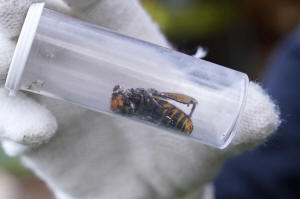Invasive 'murder hornets' are wiped out in the US, officials say
 Send a link to a friend
Send a link to a friend
 [December 19, 2024]
By GENE JOHNSON [December 19, 2024]
By GENE JOHNSON
SEATTLE (AP) — The world's largest hornet, an invasive breed dubbed the
“murder hornet” for its dangerous sting and ability to slaughter a honey
bee hive in a matter of hours, has been declared eradicated in the U.S.,
five years after being spotted for the first time in Washington state
near the Canadian border.
The Washington and U.S. Departments of Agriculture announced the
eradication Wednesday, saying there had been no detections of the
northern giant hornet in Washington since 2021.
The news represented an enormous success that included residents
agreeing to place traps on their properties and reporting sightings, as
well as researchers capturing a live hornet, attaching a tiny radio
tracking tag to it with dental floss, and following it through a forest
to a nest in an alder tree. Scientists destroyed the nest just as a
number of queens were just beginning to emerge, officials said.
“I’ve gotta tell you, as an entomologist — I’ve been doing this for over
25 years now, and it is a rare day when the humans actually get to win
one against the insects," Sven Spichiger, pest program manager of the
Washington State Department of Agriculture, told a virtual news
conference.

The hornets, which can be 2 inches (5 cm) long and were formerly called
Asian giant hornets, gained attention in 2013, when they killed 42
people in China and seriously injured 1,675. In the U.S., around 72
people a year die from bee and hornet stings each year, according to
data from the National Institutes of Health.
The hornets were first detected in North America in British Columbia,
Canada, in August 2019 and confirmed in Washington state in December
2019, when a Whatcom County resident reported a specimen. A beekeeper
also reported hives being attacked and turned over specimens in the
summer of 2020. The hornets could have traveled to North America in
plant pots or shipping containers, experts said.
[to top of second column]
|

A Washington State Department of Agriculture worker displays an
Asian giant hornet taken from a nest, Oct. 24, 2020, in Blaine,
Wash. (AP Photo/Elaine Thompson, File)

DNA evidence suggested the populations found in British Columbia and
Washington were not related and appeared to originate from different
countries. There also have been no confirmed reports in British
Columbia since 2021, and the nonprofit Invasive Species Centre in
Canada has said the hornet is also considered eradicated there.
Northern giant hornets pose significant threats to pollinators and
native insects. They can wipe out a honey bee hive in as little as
90 minutes, decapitating the bees and then defending the hive as
their own, taking the brood to feed their own young.
The hornet can sting through most beekeeper suits, deliver nearly
seven times the amount of venom as a honey bee, and sting multiple
times. At one point the Washington agriculture department ordered
special reinforced suits from China.
Washington is the only state that has had confirmed reports of
northern giant hornets. Trappers found four nests in 2020 and 2021.
Spichiger said Washington will remain on the lookout, despite
reporting the eradication. He noted that entomologists will continue
to monitor traps in Kitsap County, where a resident reported an
unconfirmed sighting in October but where trapping efforts and
public outreach have come up empty.
He noted that other invasive hornets can also pose problems:
Officials in Georgia and South Carolina are fighting yellow-legged
hornets, and southern giant hornets were recently detected in Spain.
“We will continue to be vigilant,” Spichiger said
All contents © copyright 2024 Associated Press. All rights reserved |